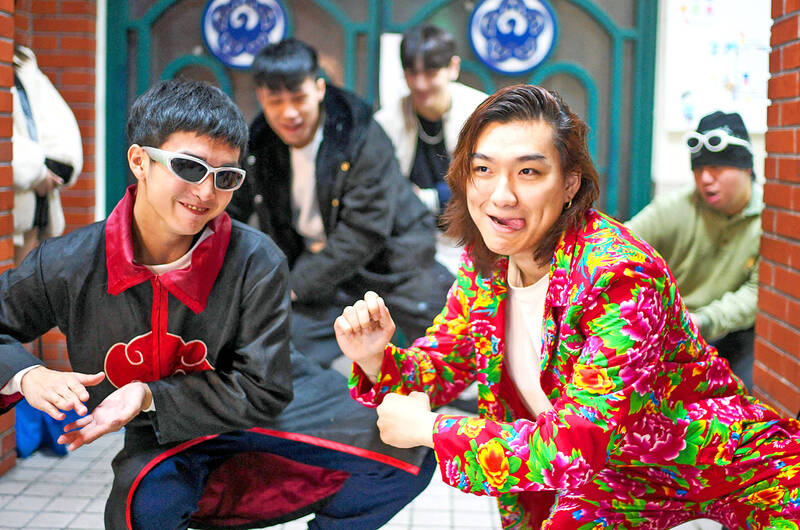Swinging side-to-side to a Chinese ditty, Taiwanese teenagers and younger children on Thursday performed at a night market competition, showing off their loose-limbed moves while executing a viral “subject three” dance that has taken social media by storm.
The competitors included young men in leather jackets and high-tops, siblings in matching denim jackets and sunglasses and even dancers improvising with pop-and-lock hip-hop moves. Yet all of them stuck to the original spirit of the kemusan (科目三) dance — which translate to “subject three.”
The style calls for dancers to look as if they are almost twisting their ankles as they flick their wrists rapidly to traditional Chinese music mixed with disco beats.

Photo: Sam Yeh, AFP
“My impression? Lots of slippery motions,” said Chang Feng, a bemused homemaker who went to Ningxia Night Market (寧夏夜市) in Taipei with her daughter to watch the aspiring trend-setters on a small stage.
Nearby, diners waited for oyster omelettes and stinky tofu at food stalls, with curious onlookers wandering over to check out the dancers.
“Seems like all the kids know how to dance kemusan — it’s a trendy thing I suppose,” Chang said.
The dance is believed to have originated from Douyin — the Chinese version of TikTok, run by the same parent company, ByteDance — with avid users jumping on the trend by performing their own versions of it, drawing millions of views.
Even businesses have tried to capitalize on the fad — such as popular hotpot chain Haidilao, whose employees twist and jerk their limbs when people order kemusan, a dish on its menu, online anecdotes and videos posted on Douyin show.
Fifth-grader Nancy Wu said she learned the dance from the platform.
“We also dance it at school. It has a demonic attractiveness to it,” the 10-year-old told reporters with an impish grin.
Yet the infectious music and jaunty moves come with a dose of controversy — some people on Facebook have accused the night market organizers of using the dance as a Chinese propaganda tool to “brainwash” young Taiwanese.
Political chatter appears to have migrated into the territory of viral Internet dances as well.
“Looks like this is a Douyin night market in China,” one person wrote in a comment on a post advertising the competition, with the comment drawing more than 230 “thumbs up.”
Ningxia Night Market Association chairman Lin Ting-kuo (林定國) said that the dance competition was purely for commercial profit. “We are using music and dance to try to increase consumer spending and promote Ningxia Night Market to the younger generation,” Lin said.
“This event is very straightforward. Don’t associate too much with it,” he said.

Chinese Nationalist Party (KMT) Chairman Eric Chu (朱立倫), spokeswoman Yang Chih-yu (楊智伃) and Legislator Hsieh Lung-chieh (謝龍介) would be summoned by police for questioning for leading an illegal assembly on Thursday evening last week, Minister of the Interior Liu Shyh-fang (劉世芳) said today. The three KMT officials led an assembly outside the Taipei City Prosecutors’ Office, a restricted area where public assembly is not allowed, protesting the questioning of several KMT staff and searches of KMT headquarters and offices in a recall petition forgery case. Chu, Yang and Hsieh are all suspected of contravening the Assembly and Parade Act (集會遊行法) by holding

PRAISE: Japanese visitor Takashi Kubota said the Taiwanese temple architecture images showcased in the AI Art Gallery were the most impressive displays he saw Taiwan does not have an official pavilion at the World Expo in Osaka, Japan, because of its diplomatic predicament, but the government-backed Tech World pavilion is drawing interest with its unique recreations of works by Taiwanese artists. The pavilion features an artificial intelligence (AI)-based art gallery showcasing works of famous Taiwanese artists from the Japanese colonial period using innovative technologies. Among its main simulated displays are Eastern gouache paintings by Chen Chin (陳進), Lin Yu-shan (林玉山) and Kuo Hsueh-hu (郭雪湖), who were the three young Taiwanese painters selected for the East Asian Painting exhibition in 1927. Gouache is a water-based

Taiwan would welcome the return of Honduras as a diplomatic ally if its next president decides to make such a move, Minister of Foreign Affairs Lin Chia-lung (林佳龍) said yesterday. “Of course, we would welcome Honduras if they want to restore diplomatic ties with Taiwan after their elections,” Lin said at a meeting of the legislature’s Foreign Affairs and National Defense Committee, when asked to comment on statements made by two of the three Honduran presidential candidates during the presidential campaign in the Central American country. Taiwan is paying close attention to the region as a whole in the wake of a

OFF-TARGET: More than 30,000 participants were expected to take part in the Games next month, but only 6,550 foreign and 19,400 Taiwanese athletes have registered Taipei city councilors yesterday blasted the organizers of next month’s World Masters Games over sudden timetable and venue changes, which they said have caused thousands of participants to back out of the international sporting event, among other organizational issues. They also cited visa delays and political interference by China as reasons many foreign athletes are requesting refunds for the event, to be held from May 17 to 30. Jointly organized by the Taipei and New Taipei City governments, the games have been rocked by numerous controversies since preparations began in 2020. Taipei City Councilor Lin Yen-feng (林延鳳) said yesterday that new measures by